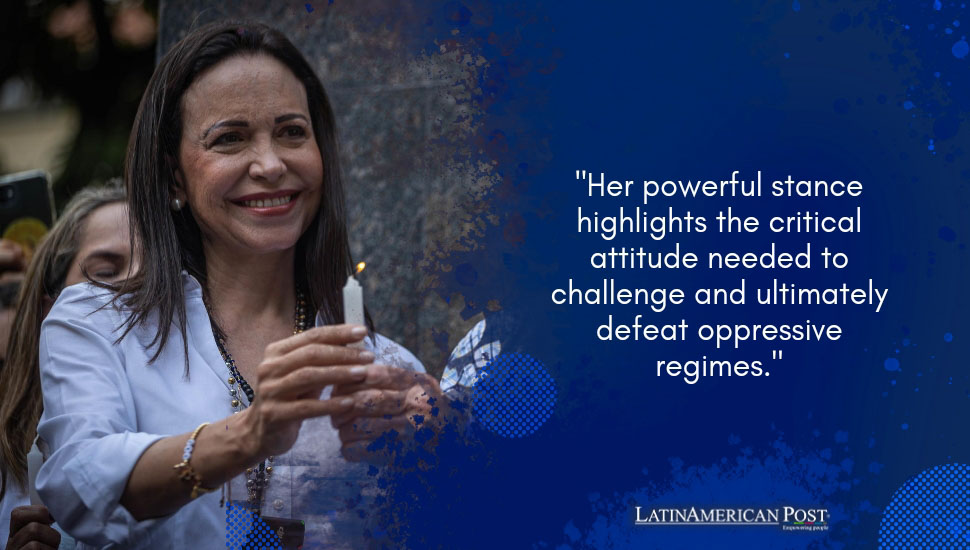Overcoming Fear to Fight Dictatorship in Venezuela

As repression intensifies ahead of Venezuela’s presidential elections, opposition leader María Corina Machado declares that fear is no longer a factor in the fight against dictatorship. Her powerful stance highlights the critical attitude needed to challenge and ultimately defeat oppressive regimes.
In an emotional speech during a campaign event in northeastern Venezuela, opposition leader María Corina Machado boldly declared: “The fear is over.” Her statement, made in the city of Maturín, Monagas state, comes as the country braces for the upcoming presidential elections on July 28th amidst increasing repression from the government of President Nicolás Maduro. Machado’s words resonate deeply with many Venezuelans seeking change and justice in a country plagued by political and economic turmoil.
Machado’s insistence that “the fear is over” is more than a rallying cry; it is a declaration of resilience and defiance against a regime that has maintained power through fear and repression. In her speech, she acknowledged the bravery of public employees who, despite being persecuted, have raised their voices and attended opposition rallies. This act of courage is a testament to the growing determination among Venezuelans to stand up against the Maduro regime.
The opposition leader’s promise of “no persecution” and “no vengeance” under the government of Edmundo González Urrutia, the candidate of the main opposition coalition, Plataforma Unitaria Democrática (PUD), offers a vision of hope and change. Machado’s assurance that public workers will be respected for their ideas and evaluated based on their merits rather than their political beliefs starkly contrasts the current climate of fear and repression.
The Role of Solidarity and Support
Machado also expressed her gratitude to the owners of vehicles and equipment used in the campaign, acknowledging the risks they take, including the potential confiscation of their property. This acknowledgment highlights the critical role of solidarity and support in the fight against dictatorship. The willingness of individuals to support the opposition, even at significant personal risk, underscores the collective resolve to challenge and overthrow the oppressive regime.
However, the reality of the situation is stark. In recent days, repression has intensified, with the Maduro government resorting to roadblocks, detentions, and threats. These actions are seen as desperate attempts by a regime that realizes it has lost the moral and spiritual battle. Machado’s assertion that the government has already been defeated “morally” and “spiritually” speaks to the broader struggle for freedom and democracy in Venezuela.
The Road to Electoral Victory
Machado’s call for a massive turnout on election day is critical in translating this moral and spiritual victory into a political one. She urged Venezuelans to channel their energy into a “relentless tide” that will sweep through the polls on July 28th. Her strategy involves voting and remaining at the polling stations until the victory is confirmed, ensuring that every vote is counted and the electoral process is upheld.
The stakes are high, as, according to polls, eight other candidates have little chance of winning besides González Urrutia and Maduro. The opposition’s challenge is to secure a victory and ensure that it is recognized and respected in a political landscape fraught with manipulation and coercion.
Machado’s stance against fear and repression in Venezuela resonates beyond its borders, reflecting broader struggles against authoritarianism in Latin America. Countries like Nicaragua and Cuba have faced similar challenges, with regimes that use fear and control to maintain power. The fight against dictatorship is not just a national issue but a regional one, where the success of opposition movements in one country can inspire and support those in others.
Latin America’s history is marked by cycles of dictatorship and democracy, with many nations still grappling with the remnants of authoritarian rule. Machado’s call to action serves as a reminder that the fight for democracy and human rights is ongoing and that overcoming fear is a critical first step in this battle. Her leadership and the courage of the Venezuelan people can serve as a beacon of hope for other countries facing similar struggles.
The Importance of International Support
The international community’s role in supporting Venezuela’s fight against dictatorship cannot be understated. Global attention and pressure can help ensure the electoral process is fair and transparent. Machado’s recognition of this need for external support is implicit in her call for solidarity and vigilance. The international community must stand with the Venezuelan people, condemning acts of repression and supporting efforts to restore democracy.
Machado’s message to the world is clear: the fight against dictatorship in Venezuela is far from over, but the resolve to overcome fear and achieve change is stronger than ever. The support of international allies can provide the necessary backing for the opposition’s efforts, helping to amplify their voices and ensure that their struggle is recognized on the global stage.
As Venezuela approaches its critical election day, the focus must remain on maintaining momentum and ensuring that the voices of the people are heard. Machado’s call for unity and determination is a powerful reminder of the importance of resilience in the face of oppression. The path forward is fraught with challenges, but the Venezuelan people can overcome the fear that has long held them back with continued courage and solidarity.
Also read: Venezuela’s Election: Maduro Faces Toughest Race in a Decade
In the broader context of Latin America, Venezuela’s fight against dictatorship serves as a rallying point for other nations facing similar threats. The region’s history of authoritarian rule provides valuable lessons on the importance of vigilance and the need for sustained efforts to protect democracy. Machado’s leadership and the bravery of the Venezuelan people offer a blueprint for others in the region, showing that overcoming fear is the first critical step toward achieving lasting change.





